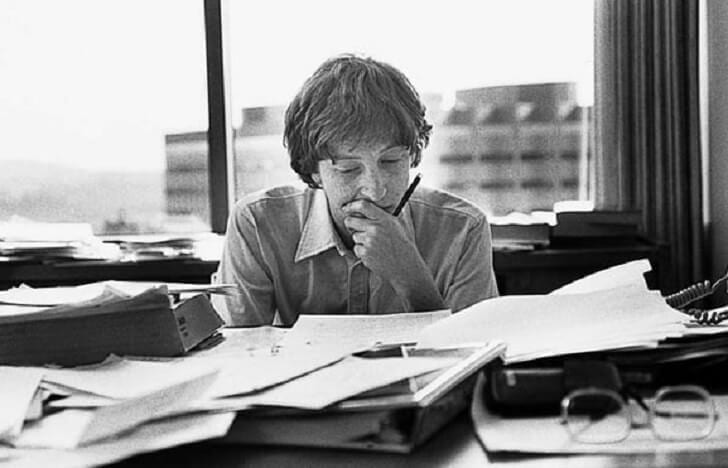Here’s How & Why You Should Totally Copy Microsoft CEO Bill Gates’ Effective Technique to Fight Work Burnout
Microsoft CEO Bill Gates has been a busy executive for decades now and even at 63, the billionaire shows no sign of stopping. Just as impressive as his $102.9 billion fortune is Gates’ enduring enthusiasm and drive to continue the work he does. Working people know just how deadly the combination of burnout and mental fatigue can be to one’s motivation and ability to perform on the job.
Bill’s ‘Think Weeks’

The young executive working in his office in the early ’80s.
As revealed in a recent column published by CNBC, Gates began taking ‘thnk weeks’ during the ’80s. The activity involved him taking the time to go to a cabin he kept somewhere in the Pacific Northwest.
Tucked in the forest, Gates would spend his week just reading pitch papers Microsoft employees wrote detailing potential investments and innovations. It was actually these think weeks which ultimately led to the 1995 launch of the Internet Explorer web browser. The activity reportedly started out as solitary trips until Gates invited other individuals to join him.
While most regular employees don’t have cabins of their own or papers to review, they can still take inspiration from the businessman’s habit, according to author and nutrition consultant Julian Hayes II.
Seeing the Big Picture

Being alone can help people temporarily get away from distractions and think more clearly.
Citing how the likes of billionaire and investment wiz Warren Buffett spend about 80% of their time thinking or reading, Hayes says that this kind of solitude can help people see the bigger picture when it comes to their outlooks.
This would also help them gain a little more self-awareness about their own life. He then emphasized how impossible it is to actually self-reflect without having to go on occasional times of being disconnected from one’s business or job.
He then suggests taking on 30 minutes of pure focus time daily if a week sounds too much or impossible to pull off at the moment.
The Importance of Deloading

Stepping away from work for a while, every once in a while will let one return to the workplace refreshed.
Talking about his own experiences, Hayes then recounted how he ended up worn-out and seeing little payoff after he neglected to consider recovery and rest on his quest to succeed in his career. He also commented about how ‘hustling at all costs’ is actually praised in today’s business landscape.
What more, Hayes said that the habit of taking breaks was even shamed in some circles. In the end, he compared the benefits of recovery time in the world of fitness to the workplace. According to Hayes, working oneself to the ground with no plans for recovery would only result in very little progress in the long run.
Similar to fitness, one must get quality sleep and good nutrition to properly recharge and recover. But aside from these, disconnecting mentally, even just partially, from the everyday happenings of one’s business or work will also do wonders. Speaking from personal experience, he shared that he usually takes a ‘seven-day deload period’ for himself at the end of each quarter.